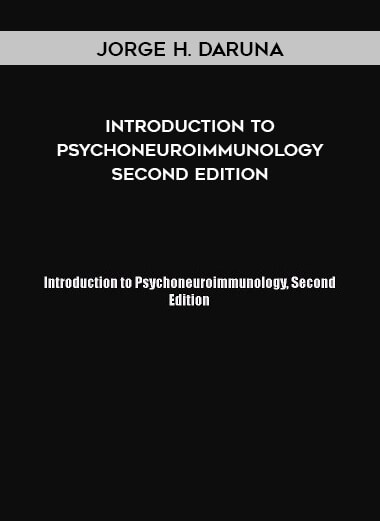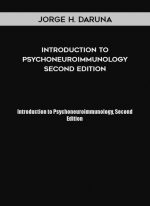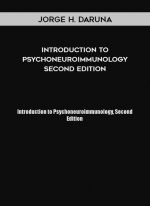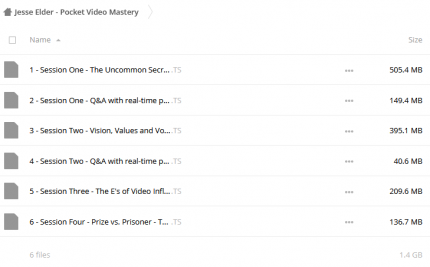
Jorge H. Daruna – Introduction to Psychoneuroimmunology Second Edition
Salepage : Preview
Arichive : Preview
Health is maintained by the coordinated operation of all the biological systems that make up the individual. The Introduction to Psychoneuroimmunology, Second Edition, presents an overview of what has been discovered by scientists regarding how bodily systems respond to environmental challenges and intercommunicate to sustain health. The book touches on the main findings from the current literature without being overly technical and complex. The result is a comprehensive overview of psychoneuroimmunology, which avoids oversimplification, but does not overwhelm the reader.
Key Features
- Single authored for consistency of breadth and depth, with no redundancy of coverage between chapters
- Covers endocrine-immune modulation, neuro-immune modulation, and the enhancing or inhibiting processes of one or more systems on the others
- Expanded use of figures, tables, and text boxes
Readership
Psychologists, neuroscientists, endocrinologists, immunologists, psychiatrists, physicians and pre- and postdoctoral students in psychology, the neurosciences, microbiology and immunology, endocrinology, physiology, and pharmacology
Table of Contents
Dedication
Preface View more >
Details
- No. of pages:
- 336
- Language:
- English
- Copyright:
- © Academic Press 2012
- Published:
- 24th February 2012
- Imprint:
- Academic Press
- Hardcover ISBN:
- 9780123820495
- Paperback ISBN:
- 9781493301218
- eBook ISBN:
- 9780123820808
About the Author
Jorge Daruna
Affiliations and Expertise
Ochsner Clinic Foundation, New Orleans, Louisiana, U.S.A.
Reviews
“This is a book that certainly comes with a ‘Wow’ factor. This updated version from a first edition published in 2004 presents itself as a succession of bioessays structured as units with subunits, so chapters and titled paragraphs. However the structure disappears into the background with the softness and strength in his writing and gently helps you to relax in your seat only to be taken on a journey of discovery of none other than your ‘innerspace’. It truly reads as a novel.” –Immunology News, November 2012
“After a historical overview and basic introduction to the immune system and endocrine-immune and neuroimmune interactions, the text discusses the concept of stress and how it influences the neuroendocrine and immune systems; the influence of psychosocial stress on specific diseases, including infection, allergy, cancer, and autoimmunity; the link between immune activity and psychopathology, using examples of autism and schizophrenia; factors that can lead to immune enhancement and protect against disease, such as the role of suggestion, beliefs and expectations, social involvement and emotional expression, sleep, relaxation, exercise, and diet; and implications for healthcare research and practice. This edition has been updated to incorporate new scientific developments, such as research on additional signaling pathways that modulate the impact of stress, genome wide association studies, and the role of exposure to microbes and physical aspects of the environment. Chapters on infectious diseases, allergy, cancer, and autoimmune disorders have been reorganized to introduce the pathophysiology, epidemiology, and genetics of each disorder.” –Reference and Research Book News, Inc.
What is Hypnosis & NLP ?
Neuro-linguistic programming (NLP) is a pseudoscientific approach to communication, personal development, and psychotherapy created by Richard Bandler and John Grinder in California, United States, in the 1970s. NLP’s creators claim there is a connection between neurological processes (neuro-), language (linguistic) and behavioral patterns learned through experience (programming), and that these can be changed to achieve specific goals in life. Bandler and Grinder also claim that NLP methodology can “model” the skills of exceptional people, allowing anyone to acquire those skills. They claim as well that, often in a single session, NLP can treat problems such as phobias, depression, tic disorders, psychosomatic illnesses, near-sightedness, allergy, the common cold, and learning disorders. NLP has been adopted by some hypnotherapists and also by companies that run seminars marketed as leadership training to businesses and government agencies.
There is no scientific evidence supporting the claims made by NLP advocates, and it has been discredited as a pseudoscience. Scientific reviews state that NLP is based on outdated metaphors of how the brain works that are inconsistent with current neurological theory and contain numerous factual errors. Reviews also found that all[dubious ] of the supportive research on NLP contained significant methodological flaws and that there were three times as many studies of a much higher quality that failed to reproduce the “extraordinary claims” made by Bandler, Grinder, and other NLP practitioners.
Jorge H. Daruna – Introduction to Psychoneuroimmunology Second Edition
Readmore About : Jorge H. Daruna









































Reviews
There are no reviews yet.